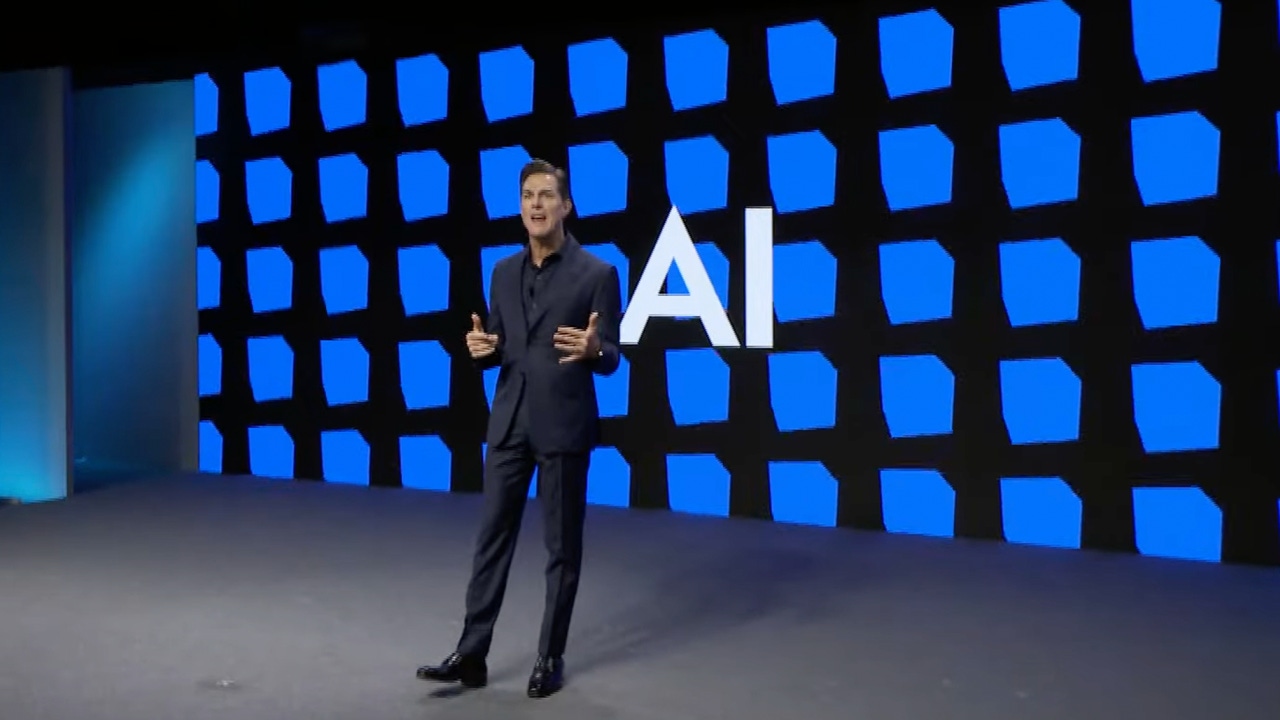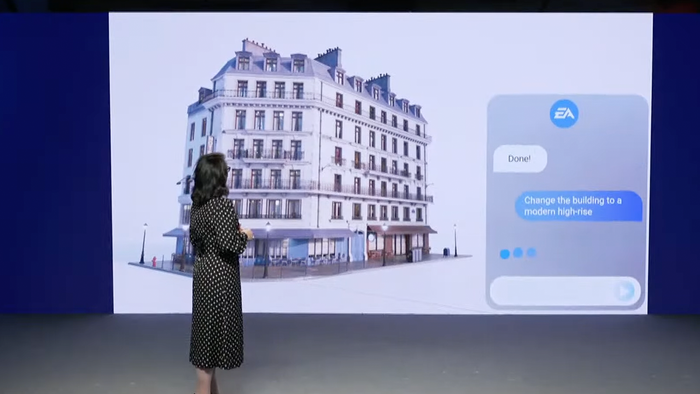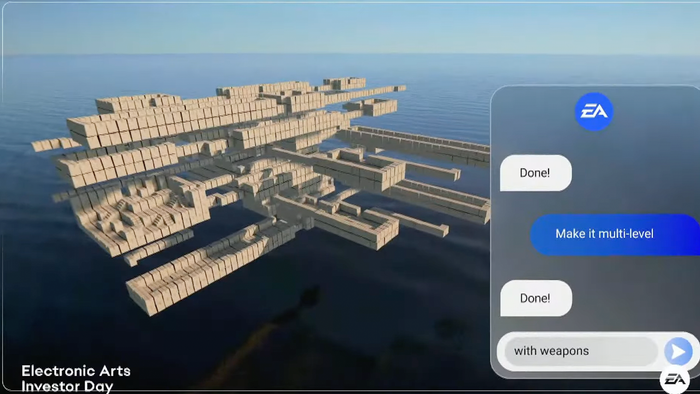Trending
Opinion: How will Project 2025 impact game developers?
The Heritage Foundation's manifesto for the possible next administration could do great harm to many, including large portions of the game development community.
EA execs say the technology is at the 'very core' of its business and could propel user generated experiences to new heights.

EA really wants people to know it's truly, madly, deeply invested in generative AI.
Taking the stage during the company's recent investor day, EA CEO Andrew Wilson spoke about how the technology is driving innovation within EA studios and said it has become "the very core of our business."
Wilson previously claimed 60 percent of EA's development processes could be "impacted" by generative AI, and said the technology is something the publisher is "embracing deeply." Those remarks came shortly after EA laid off 5 percent of its workforce.
Doubling down on that narrative, Wilson said AI isn't a "buzzword" for EA and noted the company currently has over "100 novel AI projects" in development across three categories: efficiency, expansion, and transformation.
Discussing the former, Wilson said efficiency isn't just about delivering "cost savings," but rather "doing what we do today faster, cheaper, and at a higher quality."
"That means driving more iterations, more testing and high quality content for our communities. It means removing obstacles for our game developers," he added. "It means culturalizing content across geographies so they can focus on finding more fun for more players around the world. The lowering of these friction points leads to deeper gameplay experiences."
Underlining that point, Wilson said EA couldn't have created College Football 25 without leaning on AI tools to build 150 unique stadiums and over 11,000 player likenesses. That sort of expansion is what he claims EA is driving towards.
"Expansion is about giving our creative teams an exponentially bigger canvas upon which to create, and richer colors so they might paint more brilliant worlds. It's about our incredible teams, creating characters with more depth and intelligence, telling stories that are more personal and nuanced, and bringing more authenticity and deeper immersion to our already unrivaled sports experiences," he continued.
"For years, we have talked about our games delivering experiences that are always new and different. We predict that with generative AI we will truly be able to fulfill this promise for billions of people, for billions and billions of hours."
As for transformation? Wilson believes that concept is about gazing into the distant future and considering how AI can deliver experiences that cannot be "imagined today."
"We believe AI will greatly expand and transform the entertainment experience for user generated content," he added. "It will accelerate how innovators and creators in entertainment are building and delivering experiences rooted in self expression, content creation, curation and instant gratification–the kind of entertainment that today's players and fans deeply crave."
He said that when EA's biggest franchises have been "supercharged by AI," the company will be able to cultivate massive online communities, tell compelling stories, and harness player power "beyond the bounds" of video games. Admittedly, that doesn't sound too different from what many studios are already doing.
EA Entertainment and Technology president Laura Miele was singing from the same hymn sheet. Taking over from Wilson, she explained EA is in the middle of a multi-year effort to centralize decades of 3D data and assets to bolster its development teams and Frostbite game engine.
She said that "Smithsonian" scale library has allowed EA to train its machine learning and large language models with its own proprietary data. Those models can then be used by internal teams like the Search for Extraordinary Experiences Division (SEED), which Miele described as an "innovation lab."
SEED is currently focused on areas such as "AI-enabled game development, generative arts, and procedural content," including a tool called "Script to Scene" capable of aggregating multiple workflows to help devs build characters, direct performances, and craft worlds using text or voice inputs.
She explained EA teams could use the tool to instantly generate a "four story Parisian apartment building," before requesting tweaks with additional prompts such as "add more floors to the building" (as shown below). Miele said the tech could be deployed to create entire neighborhoods, cities, and "eventually worlds."

During a later portion of the presentation, EA chief strategy officer Mihir Vaidya grabbed the baton and said EA envisions handing tools like 'Script to Scene' over to players so they can "convert their imaginations into creations without coding expertise."
He went on to clarify that "Imagination to Creation" won't enable players to create and release and support entire video games (at least, not at first), but will rather allow them to build robust user-generated experiences (UGX).
Debuting a brief concept video that stitched together some of EA's more "exciting experiments", Vaidya showed how the company's AI tools could be deployed to create impossible, previously incomprehensible realities like a "game made out of cardboard boxes."
"Make a maze of cardboard boxes," says a disembodied player voice during the demo video. That prompt resulted in the creation of simple level made from everybody's favorite shipping material.
Disappointed with their original cardboard labyrinth, the nameless players then ask their AI enabler to make the level "more complex" and "multi-level." The below image is what EA imagines its 'Imagination to Creation' toolkit might then churn out.

The video ends with two players engaging in a custom 1v1 deathmatch where only grenades are lethal. Both players were shown choosing between weapons and characters from existing EA franchises like Battlefield and Apex Legends, suggesting EA views its 'Imagination to Creation" toolkit as an open sandbox filled with remixable gameplay systems, assets, and logic from its biggest series.
Vaidya said EA wants players to be able to use that triple-A content as a "foundation" for those UGX experiences, perhaps eventually turning those creations into "chart-topping IPs."
"This would create a new level of symbiotic relationship between our own developers and UGX creators, and one with our own IPs being the launchpads for new experiences and businesses," he added. We'll let you decide whether that's a positive.
You can watch EA's full investor day presentation right here.
You May Also Like